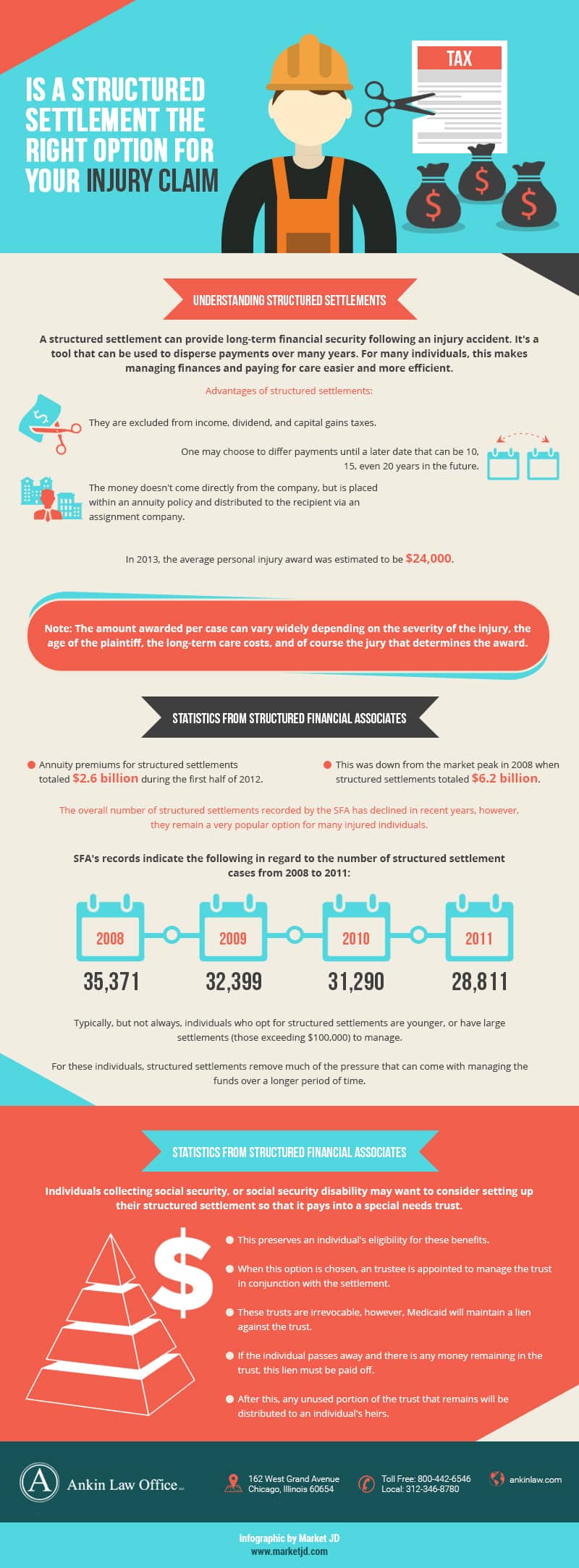What Is a Structured Settlement?
Personal injury structured settlements can provide long-term financial security following injury accidents. It’s a tool that can be used to disperse payments over many years, rather than a lump sum all at once. For many individuals, this makes managing finances and paying for care easier and more efficient.
Table of Contents
(Article continues below infographic)

One of the advantages of structured settlements set up with the assistance of a personal injury attorney in Chicago is that they are excluded from income, dividend, and capital gains taxes. You may also choose to differ payments until a later date that can be 10, 15, even 20 years in the future. This money doesn’t come directly from the company, rather it is placed within an annuity policy and distributed to the recipient via an assignment company.
In 2013, the average personal injury award was estimated to be $24,000. However, the amount awarded per case can vary widely depending on the severity of the injury, the age of the plaintiff, the long-term care costs, and of course the jury that determines the award.
Statistics From Structured Financial Associates
According to Structured Financial Associates (SFA), annuity premiums for structured settlements totaled $2.6 billion during the first half of 2012. This was down from the market peak in 2008 when structured settlements totaled $6.2 billion.
The overall number of structured settlements recorded by the SFA has declined in recent years, however, they remain a very popular option for many injured individuals.
SFA’s records indicate the following in regard to the number of structured settlement cases from 2008 to 2011:
2008 – 35,371
2009 – 32,399
2010 – 31,290
2011 – 28,811
Typically, but not always, individuals who opt for structured settlements are younger, or have large settlements (those exceeding $100,000) to manage. For these individuals, structured settlements remove much of the pressure that can come with managing the funds over a longer period of time.
Structured Settlement Pros and Cons
There are a variety of factors that influence whether a structured settlement is the best option for a claimant.
The Pros of Opting for a Structured Settlement
- Structured settlements are tax-free
- If a recipient passes away, his or her beneficiaries will continue to receive payments
- Claimants can stretch payments out over nearly any length of time
- Payments that are spread out over time help to secure more long-term financial security
- Structured settlements can yield more than a lump sum payment if interest rates apply to your annuity
The Cons of Structured Settlements
- Structured settlements leave little room for renegotiation or altering in the future
- Claimants do not have access to the initial lump sum, meaning they can’t choose to place funds into higher yielding investments
- Some portion of the payout may be lost to administrative fees
Personal Injury Structured Settlements and Social Security
Individuals collecting social security, or social security disability may want to consider setting up their structured settlement so that it pays into a special needs trust. This preserves an individual’s eligibility for these benefits. When this option is chosen, a trustee is appointed to manage the trust in conjunction with the settlement. These trusts are irrevocable, however, Medicaid will maintain a lien against the trust. If the individual passes away and there is any money remaining in the trust, this lien must be paid off. After this, any unused portion of the trust that remains will be distributed to an individual’s heirs.



